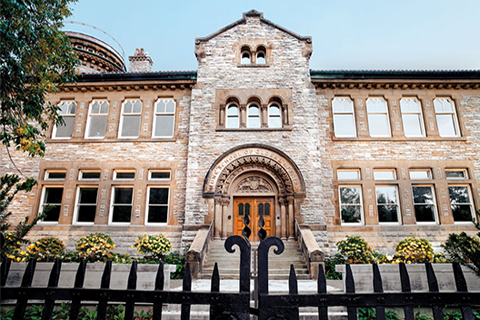Medical students undergo extensive training in hospitals before they become doctors, engineers undertake a “professional year” and law students article before they’re licensed to be lawyers. Now, students pursuing a master of global affairs at the Munk School are getting their own version of professional experience – a three-month placement at an international organization outside of Canada.
Janice Stein, the Munk School’s longtime director, says she and her colleagues have forged dozens of international partnerships in the private, public and volunteer sectors, a view to providing students with a variety of relevant opportunities in their field. “Ours is explicitly a professional program,” says Stein. “It’s designed to give students real-world experience that will give them an advantage when they start looking for work.”
The placements are one of a number of recent, far-reaching changes meant to position U of T’s Munk School of Global Affairs among the world’s top international studies programs. Last fall, the Munk School expanded from its existing location at Trinity College into an additional site at Bloor Street and Devonshire Place – a renovated and restored heritage building that doubles the amount of space for students, faculty and staff. It’s also home to the new Canada Centre for Global Security Studies. The Munk School’s physical expansion and hiring of new faculty were made possible by a landmark $35-million gift in 2010 from Peter and Melanie Munk, and $25-million contributions from the federal and provincial governments.
Peter Munk, a businessman and humanitarian, earned a degree in electrical engineering from U of T in 1952, after immigrating to Canada from Hungary via Switzerland. As one of Canada’s leading philanthropists, he is proud of this country’s record on freedom of speech, multiculturalism and health care – and in the Munk School’s role in transmitting these values around the world. His and Melanie’s gift is the largest-ever individual donation received by the University of Toronto.
At the official opening of the new building in September, U of T president David Naylor praised the Munks’ vision: “Only with outstanding intellectual leadership can the advantages of globalization be maximized, and the threats, constrained,” he said. “Thanks to the prescience and generosity of Peter and Melanie Munk, Canada’s leadership capacity has been significantly enhanced.”
To train the next generation of leaders in a way that recognizes the interdisciplinary nature of challenges facing the world, the Munk School has forged links with other U of T faculties to offer new courses and degrees. With the iSchool, it will offer a course about analyzing big databases to make cities “smarter,” and with the Dalla Lana School has developed a course on human rights in global health. Students can already combine their master’s degree in global affairs with a law degree or an MBA. Starting in 2015, they will also be able to combine it with a master of applied science. “These initiatives,” says Stein, “build on core disciplines at U of T to create strength in new cross-disciplinary topics.”
A similar idea infuses the Munk School’s approach to faculty research. The Citizen Lab, led by Prof. Ron Deibert, continues to investigate cyber-security from political, economic and technological perspectives, while the new Innovation Policy Lab brings together faculty from across the university – including Rotman, medicine and engineering – to study how innovation occurs. The group, headed by Prof. David Wolfe of political science, is asking the question, what difference do business strategy and volunteer-sector and government policy make in generating successful innovation? As the name of the lab implies, researchers aim to crack open the role policy plays in successful innovation. “It involves deciding how we define what an innovation is and the factors that enable it,” says Wolfe, “and how to replicate these across many different industries and cultures.”
Recent Posts
For Greener Buildings, We Need to Rethink How We Construct Them
To meet its pledge to be carbon neutral by 2050, Canada needs to cut emissions from the construction industry. Architecture prof Kelly Doran has ideas
U of T’s 197th Birthday Quiz
Test your knowledge of all things U of T in honour of the university’s 197th anniversary on March 15!
Are Cold Plunges Good for You?
Research suggests they are, in three ways





